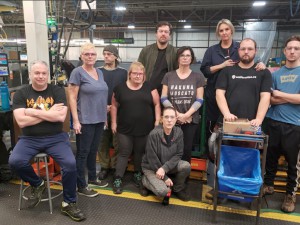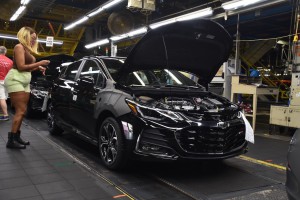
GM CEO Mary Barra told the Automotive News World Congress that she understood why people were upset by GM's plans to close five plants.
General Motors fumbled its recent announcement about its plans to close plants in the U.S. and Canada, GM’s top executive acknowledged.
During an appearance at the annual Automotive News World Congress, GM Chairman and CEO Mary Barra said the timing of the announcement in November that the company planned to close plants in and around Detroit, Lordstown, Ohio, Baltimore and Oshawa, Ontario, was driven by the change in customer preferences away from cars and to SUVs.
“Having been at General Motors for 38 years, I feel a huge obligation to make sure that General Motors is successful not just a for a few years. I want GM to be successful for many, many decades,” Barra said.
“We knew it was time to make the next steps in the transformation of the company and we also knew the best time to do it is to do it was when the economy was strong because it provides the best opportunity for our employees,” she added.
(GM expects bigger profits, more transformation in 2019. Click Here for the story.)
GM was preparing to expand production at plants building trucks and SUVs, she noted.

Workers at GM's plant in Oshawa, Ontario, staged a sit-down strike after the company rejected plans to keep the plant open.
“I get the emotion, ” said Barra about the outcry that immediately followed GM’s announcement which not only brought angry tweets from President Donald Trump, but also was condemned by both Democratic and Republican Senators and Congressmen as well as union leaders in both the U.S. and Canada.
Barra recounted that she had lived through a plant closing early in her career when she was a maintenance supervisor at a GM assembly plant in Pontiac, Michigan, near where she grew up, that GM abruptly closed in the 1980s. “I had an understanding of what those people were going through because I’d see them a year later and we’d talk about it,” she said. “That was the community in which I lived,” added Barra.
“So I understand the emotion. One, somebody’s life is changing and two, it’s having an impact on the community,” noted Barra. The GM chairman also said she wasn’t surprised by the adverse political reaction. “They represent the people in those districts,” she said.
(Click Here for more about GM revamping responsibilities for Ammann, Reuss.)
“What wasn’t well communicated (by GM) is that of the 2,800 people impacted in the U.S., we had 2,700 jobs,” she said. In addition, more than 1,200 of the employees are eligible to retire.

A UAW lawsuit said as many as 700 Lordstown workers could be used at an Indiana plant instead of temporary workers.
Some 1,500 of the workers displaced by the closing of the plants building passenger cars have volunteered to move to plants building trucks and SUVs. “Seven hundred are already on their way” to the new jobs at other GM plants in the U.S.
In Canada, GM working with local government, community groups and junior colleges, have identified 5,000 job opportunities for the 1,500 workers impacted by the impending shut down of the assembly plant in Oshawa.
“We will be able to demonstrate that General Motors does care,” she said.
(To see more about Mary Barra’s radical reshaping of General Motors, Click Here.)
Overall, GM’s recent restructuring efforts have been successful, pointing to the decision to sell its European operations to PSA in 2017 as a positive development. “We really feel we created a win-win-win in Europe. It was rights for Opel-Vauxhall employees. It was right for PSA and General Motors continues to participate with our ownership piece.”
